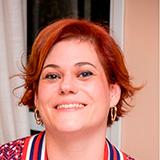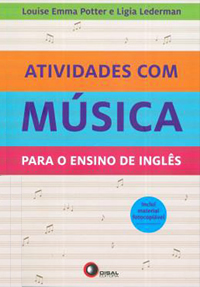By - Carmem Foltran

At the very beginning of my career, I remember having one of those down-the-hall conversations with a more experienced colleague. He said: “I’ve been really thinking about what I want to do with my life. The truth is, I don’t know if I want to be teaching the verb “to be” 10 years from now, answering the same questions students ask, over and over again”
To a rookie like me then, it sounded almost like a death threat: days and days of the same numbing routine, dealing with difficult students and strict coordination demands. A future as an educational automaton doomed to a life-time of unchanged lessons plans and endless bureaucracy. When I look back at that conversation with my colleague, I understand where he was coming from and why I panicked at his remark: ELT in Brazil didn’t offer as many options as it does today. Internet was already a fact but it was not as developed as it is today, with video-streaming and social networks, so we didn’t really know how (or had the tools) to change our game. It was as if we had no other option!
Fast-forward to year 2017. I have taught young learners and adults in language institutes, I have taught undergraduate and post-graduate students at universities. I have been a free-lance teacher, a translator and a course developer. I have been a speaker in 5 conferences in Brazil. My teaching career took me to the Silicon Valley twice. And it has taken me over and over again to a place I know well: uncertainty.
For at least 6 or 7 years into my teaching career I wasn’t 100% sure I wanted to be an English teacher. Therefore, I worked on a master’s degree in literature, because I thought I’d be happier teaching literature to undergraduates. But after I finished my master’s dissertation, getting a position at a university proved a lot harder than I thought. So I quit a job in a prestigious language school to become a translator. The plan was to work as a translator until I got a degree in Law, as I seemed to have run out of options in my teaching career. Six months later, I had a full schedule as a free-lance teacher. And translation was something I was doing on the side, from 10:00pm to midnight, or whenever I didn’t have classes. I never went to Law school.
It wasn’t until that moment in my life, my first plunge into the professional unknown, that I was faced with what I like to think of as creative uncertainty. I didn’t know whether being a translator or a lawyer was going to work, but it was better than staying still, for I knew no good was coming out of it. I learned much more than I expected in the process. And doors which I never thought even existed suddenly opened up.
My career as a translator was short, but it gave me the tools to the next step. I was invited to teach a post-graduate course on translation, and I felt I was prepared for that because of all the research I had done the area. However, I only landed in this job because I had a Masters’ degree in literature. And I could only take this opportunity because of the flexibility I had due to being a free-lance teacher.
This summarizes the first 10 years of my career, which set me straight to a second, more stable phase, full of possibilities as I became an English teacher in an IT college. In hindsight, all of these changes were only possible because I had learned how to deal with uncertainty, with the fear of trying out new possibilities, or asking myself what was out there for me. Was it an easy ride? Of course, not. I wouldn’t be as naïve or irresponsible as to claim that. There were a lot of sleepless nights. There was an awful lot of anxiety and self-doubt. There were very few people I could talk to and share thoughts with, as Education can be a very conservative area in many aspects. Teachers are not usually encouraged to try out different paths from those of regular schools and language institutes, so I felt very isolated at times. However, in my search for options, I found people who had traced alternative paths in their career, and who played a fundamental role in all the different turns my career took. Today I hardly remember the nail-biting weeks, but I always remember the learning and growing, which made all future moments of professional uncertainty easier to be dealt with. And today, whenever I face one of those moments, I see them as creative moments rather than cringing and flinching moments. Because these are the moments when I’m going to learn the most, and I’m going to have the best ideas, and I might choose to work on new projects.
What has brought me to this reflection? After 17 years into my career, as I quit my job teaching English to IT undergraduates in 2016, life has brought me to my creative uncertainty again. And this time it really feels more of a creative moment than of an uncertainty moment. Going back to free-lance teaching has given me the chance to carefully plan the next steps, as I’m financially covered and I can plan time to study, to do research and to network. Having gone on a limb in the past has taught me how to look for new opportunities, and how to patiently keep an eye out for what life might bring to my professional door.
What has brought me to this reflection? After 17 years into my career, as I quit my job teaching English to IT undergraduates in 2016, life has brought me to my creative uncertainty again. And this time it really feels more of a creative moment than of an uncertainty moment. Going back to free-lance teaching has given me the chance to carefully plan the next steps, as I’m financially covered and I can plan time to study, to do research and to network. Having gone on a limb in the past has taught me how to look for new opportunities, and how to patiently keep an eye out for what life might bring to my professional door.
When is it the right time to embrace uncertainty and plunge into the professional unknown? How to know when it is the right moment of one’s career? It’s almost impossible to tell, but of course it involves not being satisfied with what one’s doing (or not doing). It also involves a lot of work on one’s self-esteem, as these moments of uncertainty come at times when we question our work, our abilities, and our capacity. It is very hard to believe in yourself when the place you work for might not recognize your efforts. Or you might have been made redundant, or your project might have been canceled without warning. At this point, listing your professional achievements, as they were somebody else’s, is fundamental to bounce back from the negative feelings that might arise when things don’t go as planned, and might point directions to follow. We are very open to praising other professionals, but very coy when it comes to singing our own praises.
Also, it is vital to bear in mind that any career change takes time. It took me 3 years after I quit my job at a language school to be established as a professor. During those 3 years I had a number of plans designed, in case I failed in whatever I had set out to achieve. And the truth is the best opportunities I had were never exactly what I was searching for. But they were amazing, and I learned a lot from them. Even from failures. Yes, there is a significant amount of failing when looking for new opportunities. With the right mindset, the amount of succeeding definitely outweighs failing. Embracing uncertainty in the first place is definitely succeeding.
It has been 17 years since I had that conversation with my colleague. That thought, of teaching “the verb to be” until I retire, does not scare me the least. It has become part of my mindset to look for alternatives (even on how to teach the verb to be, just to give a very pedestrian example). A career in education is a fruitful one, which allows for lots of creativity, as long as we teachers are willing to embrace uncertainty every now and then. The uncertainty of pursuing a different path, the uncertainty of looking for a new job or asking for a promotion, the uncertainty of trying a new approach to teaching in the school you have worked at for years, the uncertainty of teaching online, the uncertainty of speaking at a conference, the uncertainty of sharing thoughts with friends or strangers on social media.
Today, I have stepped into a brand-new uncertainty: writing for a blog. Only time will tell how it goes.
Carmem Foltran holds a Master’s Degree in English and American Literature, and a degree in English and Portuguese from FFLCH-USP. She also holds the IH Certificate in Online Tutoring. She has been a teacher for 17 years and has also worked as a course developer, teacher trainer and translator. She has taught undergraduate and postgraduate courses. She has recently embraced uncertainty once more and is currently DoS and teacher at her new enterprise, Dynamic Class. If you want to get in touch with the author or learn more about Dynamic Class, don’t be a stranger!
www.dynamicclass.com.br
carmem.foltran@dynamicclass.com.br
https://www.facebook.com/carmem.foltran
https://www.linkedin.com/in/carmem-foltran-72941121/
LIVRO RECOMENDADO
